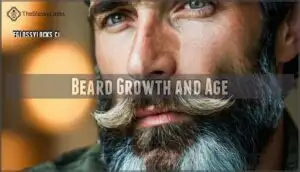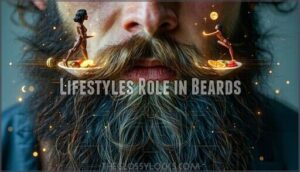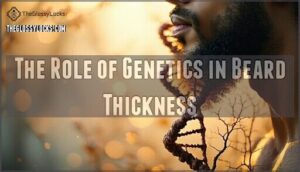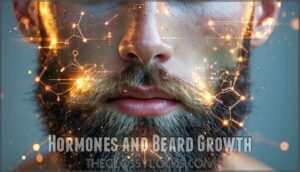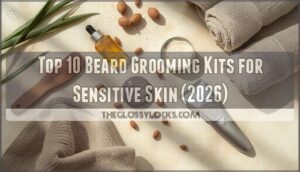This site is supported by our readers. We may earn a commission, at no cost to you, if you purchase through links.
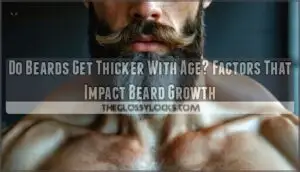
Most men see increased density and coarseness through their twenties and thirties as testosterone levels rise and hair follicles fully mature.
However, genetics play the biggest role in determining your beard’s ultimate thickness. Some guys hit their facial hair peak early, while others continue filling in patchy spots well into their forties.
Your hormones, diet, stress levels, and overall health also influence growth patterns. Think of it like building muscle—consistency and the right conditions matter.
Understanding these factors can help you maximize your beard’s potential and work with what nature gave you.
Table Of Contents
- Key Takeaways
- Do Beards Get Thicker With Age?
- Beard Growth and Age
- Factors Affecting Beard Thickness
- The Role of Genetics in Beard Thickness
- Hormones and Beard Growth
- Beard Growth Patterns
- Lifestyle Factors That Influence Beard Growth
- Health Conditions Affecting Beard Thickness
- Frequently Asked Questions (FAQs)
- At what age is the beard thickest?
- Why is my beard getting thicker as I get older?
- What is the 3 month rule for beards?
- Do beards grow more with age?
- At what age does a beard get thicker?
- Does a beard grow thicker over time?
- Will my beard fill in after 30?
- What age does a beard stop filling in?
- Does age affect beard thickness?
- When does a beard grow thicker?
- Conclusion
Key Takeaways
- Your beard typically reaches peak thickness around age 30 when testosterone levels stabilize and hair follicles fully mature, though genetics determine your ultimate potential more than age alone.
- You’ll likely see the most dramatic thickening during your twenties and early thirties, but don’t expect significant density increases after 30 since growth patterns stabilize at that point.
- Your lifestyle choices directly impact beard thickness—maintain a protein-rich diet with vitamins like biotin and zinc, exercise regularly to boost testosterone, and manage stress to prevent cortisol from thinning your facial hair.
- You can’t change your genetic blueprint, but if your family has a history of thick beards and you’re patient through patchy phases, you’ll likely see continued filling-in well into your thirties or even forties.
Do Beards Get Thicker With Age?
Beards tend to mature and thicken with age, particularly during your twenties and early thirties, when beard growth is at its peak stage.
During this growth timeline, your genetics largely dictate how full your beard becomes.
Hormonal changes, especially levels of testosterone and dihydrotestosterone (DHT), play a key role in density changes as part of the natural aging process.
However, these same hormones may start to decline after your early thirties, slowing beard growth.
Even so, maintaining healthy habits—like a proper diet, regular exercise, and stress management—can support your beard’s thickness over time.
While aging beards differ, every journey to beard maturation is unique, shaped by both biology and lifestyle choices.
Beard Growth and Age
Your beard changes as you age, influenced by follicle growth cycles and shifting DHT sensitivity. During puberty, testosterone sparks rapid growth, but as the aging process continues, progress varies.
Your beard’s story unfolds with age—testosterone drives early growth, but time and hormones shape the final chapter.
By your late 20s or early 30s, most men’s beards reach peak thickness, with some noticing slower growth afterward. A key factor is understanding the beard growth stages for ideal care.
- Aging beard changes: Testosterone may decline, reducing density.
- Beard maturity timeline: Your beard often stabilizes by 30.
- Peak beard age: For some, full density lasts decades; others notice thinning earlier.
Each beard tells its own story—embrace yours!
Factors Affecting Beard Thickness
Your beard thickness depends on several factors, including genetics, hormones, and lifestyle choices.
Understanding how these elements work together can help you figure out why your beard grows the way it does.
Genetic Influences on Thickness
Your family history plays a big role in how thick your beard gets.
Ethnic predispositions, like those from Mediterranean or Middle Eastern roots, often lead to denser facial hair.
These DNA variations dictate how your follicles respond to hormones, shaping beard genetics.
Thanks to inherited traits, some men can grow full beards with ease, while others may see patchier growth.
It’s all in the genes!
Hormonal Contributions to Growth
Facial hair relies heavily on testosterone levels and DHT influence, acting as the driving forces in beard growth.
However, hormonal imbalances can cause weak or patchy beards.
One vital factor often overlooked is how deep sleep impacts beard health.
Watch out for:
- High testosterone/DHT = thick beards
- Estrogen impact: weakens hair follicles
- Cortisol effects: thins beards via stress
Medical solutions may address stubborn growth issues.
Lifestyles Role in Beards
Your lifestyle holds the reins to better beard growth. A good diet, exercise, and stress management make all the difference.
Here’s a quick breakdown:
| Lifestyle Element | Benefit for Beards | Practical Tip |
|---|---|---|
| Diet | Boosts overall growth | Eat protein and biotin-rich foods |
| Exercise Benefits | Improves blood flow | Incorporate strength training |
| Stress Reduction | Prevents shedding | Try yoga or meditation |
| Grooming Practices | Promotes healthy hair | Use beard oils and trim wisely |
| Sleep Quality | Aids hair regeneration | Aim for 7-9 hours nightly |
A good diet, exercise, and stress management are crucial for better beard growth. Grooming practices and sleep quality also play a significant role in promoting healthy hair and aiding hair regeneration.
The Role of Genetics in Beard Thickness
Genetics heavily influences your beard thickness. Inherited traits, follicle sensitivity, and DNA variations determine how dense your facial hair will be.
If you’ve got a strong family history of full beards, chances are good you’ll follow suit. Ethnic predisposition also plays a role—men of Mediterranean and Middle Eastern origin often sport naturally thick beards.
While your genetics set the foundation, growth patterns vary among individuals. If thickness doesn’t meet your expectations, advancements like neograft FUE hair restoration can provide that extra boost.
Hormones and Beard Growth
Your beard’s thickness hinges on hormonal changes that fuel growth.
Testosterone and DHT are the powerhouse beard hormones driving follicle activity through DHT stimulation.
When testosterone peak years arrive (late twenties to early thirties), you’ll see maximum growth potential.
However, estrogen effects can weaken follicles, while cortisol impact from stress thins your beard.
Hormonal imbalances directly affect beard growth density.
Maintaining balanced hormone levels keeps your facial hair thick and healthy throughout life.
A balanced diet with nutritional lifestyle support can further enhance beard growth.
Beard Growth Patterns
Your beard’s blueprint is as unique as your fingerprint, with beard growth patterns varying dramatically across your face.
Your beard tells its own story—embrace the unique journey of growth, thickness, and character that comes with each passing year.
Understanding these patterns helps explain why some areas fill in faster than others during the aging process.
Beard growth follows predictable stages influenced by hormonal changes:
- Growth Rate varies by facial zone – your chin might outpace your cheeks by months
- Patchy Growth often resolves naturally as hair cycles mature over time
- Terminal Length differs between follicles, creating natural layering effects
- Ethnic Variations determine density and texture, with genetics trumping age
Recognizing your pattern prevents unnecessary worry about beard thickness development.
Lifestyle Factors That Influence Beard Growth
Your daily habits can substantially impact your beard’s thickness and overall health as you age.
What you eat, how often you exercise, and how well you manage stress directly affect hormone levels and blood flow to your hair follicles, which can be considered a key factor in maintaining overall health.
Balanced Diet Importance
What you eat directly impacts your beard’s potential.
Nutrient deficiencies can stunt growth, while proper protein intake fuels follicle development.
Vitamin impact on beard thickness is significant—especially biotin and vitamin D.
One should also consider foods rich in zinc for ideal beard health.
Here’s your nutrition game plan:
| Nutrient | Beard Benefits |
|---|---|
| Protein | Strengthens hair structure |
| Zinc | Supports follicle health |
| Vitamin D | Enhances growth rate |
| Biotin | Improves thickness |
| Iron | Prevents hair loss |
Mineral support and hydration effects can’t be overlooked either.
Exercise and Beard Health
Regular exercise benefits your beard by delivering a natural testosterone boost that fuels growth.
Weight training works best for hormone production, while cardio enhances circulation improvement to hair follicles.
You’ll notice improved beard vitality as better blood flow nourishes roots.
Many men also explore supplemental options to further enhance their testosterone levels.
This lifestyle change supports overall health and creates ideal conditions for robust beard growth through increased testosterone levels.
Stress Management Techniques
When stress hormones spike, your beard pays the price through disrupted hormone balance and poor circulation.
Smart stress management becomes your secret weapon for maximum growth. These holistic approaches reduce cortisol while supporting mental wellness:
- Daily meditation – Promote sleep quality and hormone regulation
- Regular yoga – Improve circulation to facial follicles
- Deep breathing – Lower stress hormones naturally
To further aid relaxation, consider guided meditation options.
Health Conditions Affecting Beard Thickness
Why does your once-thick beard suddenly start looking patchy?
Health conditions can dramatically impact beard thickness, often serving as early warning signs.
Autoimmune disorders like alopecia areata create sudden bald spots, while thyroid issues disrupt hormonal balance affecting DHT and testosterone levels.
Nutritional deficiencies weaken hair follicles, and skin infections damage growth patterns.
Hormonal imbalances from diabetes or metabolic disorders also thin facial hair. If you notice rapid changes, consult your doctor immediately.
Frequently Asked Questions (FAQs)
At what age is the beard thickest?
Most men hit their beard’s peak thickness around age 30, when testosterone levels stabilize and hair follicles reach full maturity.
Your beard won’t get substantially thicker after this point, though genetics play the biggest role, and testosterone levels have a significant impact on beard growth.
Why is my beard getting thicker as I get older?
Your beard’s getting thicker because testosterone levels often remain stable or even increase slightly in your thirties.
Plus, your hair follicles are still maturing, creating coarser, denser facial hair over time.
What is the 3 month rule for beards?
Like waiting for fine wine to mature, the 3-month rule means you’ll resist trimming your facial hair for a full quarter-year.
This patience lets you discover your beard’s true potential and natural growth pattern.
Do beards grow more with age?
Generally, your facial hair reaches peak thickness by age 30, then growth slows down.
While some men notice continued filling-in through their thirties, most won’t see significant increases in beard density after that point.
At what age does a beard get thicker?
Good things come to those who wait.
Your beard typically reaches peak thickness around age 30, after testosterone levels stabilize and hair follicles fully mature through your twenties following puberty’s initial growth phase.
Does a beard grow thicker over time?
Your beard typically reaches peak thickness around age 30, then growth stabilizes.
While individual hairs may coarsen slightly over time, overall density won’t dramatically increase.
Genetics and hormones matter more than age.
Will my beard fill in after 30?
After hitting the three-decade mark, your facial hair’s destiny is largely sealed.
Growth patterns stabilize around thirty, so don’t expect dramatic changes.
Genetics and hormones have already determined your beard’s maximum potential by now.
What age does a beard stop filling in?
Your beard typically stops filling in around age 30 when growth patterns stabilize. After this point, you’ll see minimal thickness changes, though genetics and hormones can still influence individual results.
Does age affect beard thickness?
Like a fine wine that changes with time, your beard’s thickness follows a predictable pattern.
Age definitely affects thickness—it typically peaks around thirty, then may thin due to declining testosterone and slower follicle cycles, which is a predictable change.
When does a beard grow thicker?
Your beard typically thickens most between ages 18-30 as testosterone peaks and hair follicles mature. Growth stabilizes around 30, though genetics determine your maximum thickness potential more than age alone.
Conclusion
Take Marcus, a 28-year-old who worried his patchy beard would never fill in.
By 35, his once-sparse jawline developed into a full, thick beard as his follicles matured.
Your beard’s journey follows a similar path—do beards get thicker with age? Generally yes, but genetics set your limits.
Focus on proper nutrition, manage stress, and exercise regularly to maximize your potential.
Remember, some men see changes into their forties, so patience pays off when growing your ideal beard.

